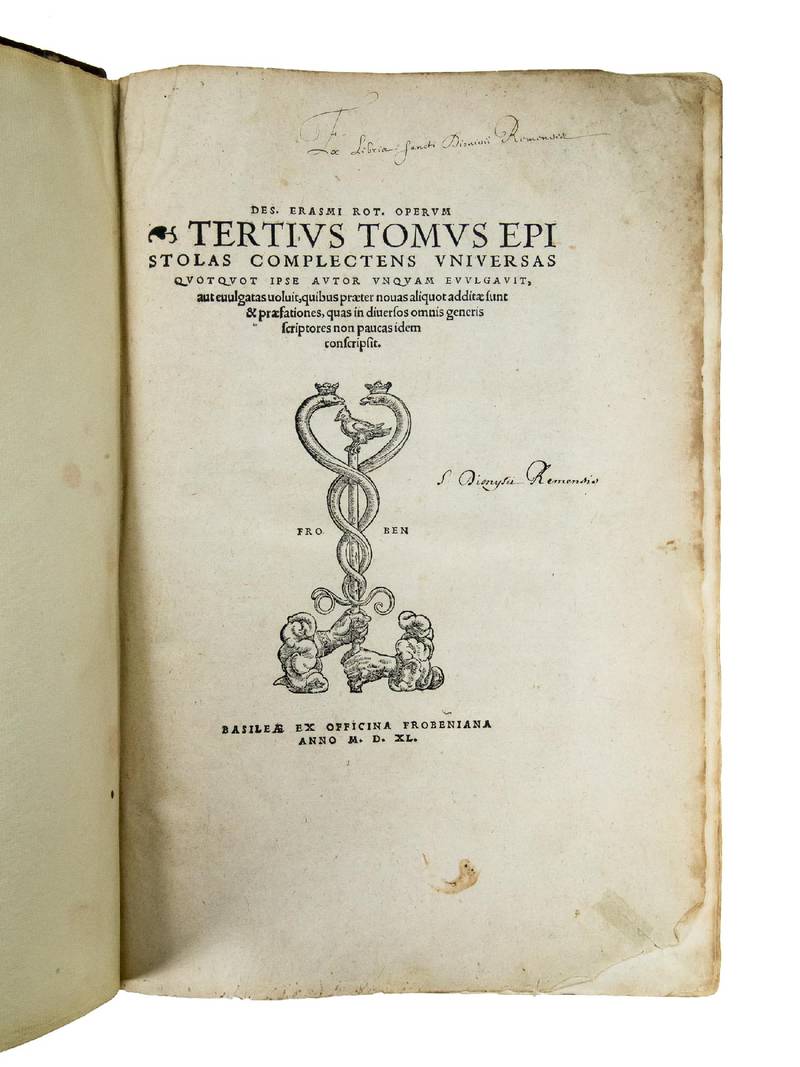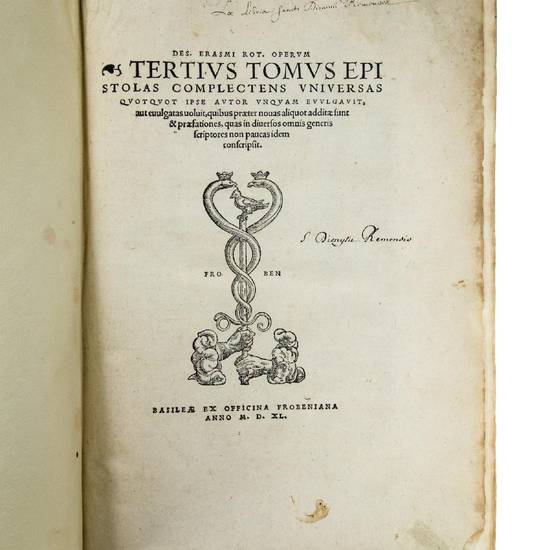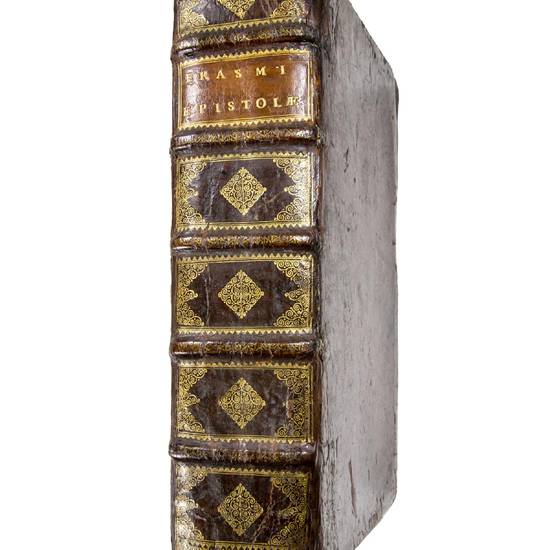Folio. (12), 1213, (3) pp. [α]6, a-z6, A-Z6, Aa-Zz6, Aaa-Zzz6, Aaaa-Hhhh6, Iiii8. With the printer's device on the title-page and at the end. 18th century full calf, gilt back with gilt title on morocco label, ownership's entry of the Abbey of St. Denis of Reims, some old marginal annotations.
Adams, E-309; Index Aureliensis, 163.036; VD 16, E-1864; P.S. Allen, The Principal Editions of Erasmus' Epistolae, in: “Opus Epistolarum Des. Erasmi Roterodami”, (Oxford, 1906), I, p. 601; P.S. Allen, H.M. Allen & H.W. Garrod, eds., Opus epistolarum Des. Erasmi Roterodami, Oxford, 1906-1958, passim; I. Bezzel, Erasmusdrucke des 16. Jahrhunderts in Bayerischen Bibliotheken, (Stuttgart, 1979), no. 4-5; F. Van der Haeghen, Bibliotheca Erasmiana, (Nieuwkoop, 1961), I, p. 100.
FIRST COMPLETE COLLECTION of Erasmus' letters. “In the collected edition of Erasmus works, prepared by his executors [Hieronymus Froben and Nikolaus Episcopius], the volume of letters was the first to appear (N1), in 1538. It seems to have sold rapidly, for it was reprinted in 1541 (N2), and again in 1558 (N3). These three volumes are for the most part substantially the same. All the earlier editions were reprinted in them, and a few new letters added; together with some prefaces in accordance with Erasmus wishes, and other printed matter, which had appeared under his name. There are, however, slight divergences of reading, and in one point a notable difference. N2 has, on p. 1114, a short letter to a certain George Loxanus, Vice-Chancellor of Bohemia, squeezed in between two to Gilbert Cousin (Lond. xxvii. 50 and 51). This letter is not in N1; and from the fact that it has been removed again in N3, though the reference to it is found in the index, we may conclude that its insertion in N2 was procured by Loxanus through surreptitious means and did not find favour with Episcopius, unless N3 was reprinted directly from N1” (Allen, op. cit., I, pp. 596-597).
However, it is not clear which edition Allen consider N2, because it has been reissued at least 5 times between 1538 and 1541 under two different titles (either Epistolarum opus complectens universas or Operum tertius tomus epistolas complectens universas), always with exactly the same collation. Under the first title the work was printed in 1538 (VD 16, E-2928) and in 1538/1541 (VD 16, E-2929 and E-2930); under the second title in 1540/1538 (VD 16, E-1864, the present edition) and in 1540/1541 (VD 16, E-1865).
The collected edition of Erasmus' works appeared in Basel in 9 volumes of text and 1 volume of index between 1538 and 1541. The plan for it was set down by Erasmus himself, first in a letter to Johann von Botzheim, dated January 30, 1523, and again with some alterations in a letter to Hector Boèce of March 15, 1530. Erasmus divided his shorter works into groups according to subject matter or purpose, while the larger ones were left to stand by themselves, all with little concern for chronological sequence. The canon of Erasmus' works thus established was followed by his executors. Beatus Rhenanus, one of the editors, provided, in the form of a dedicatory letter to Charles V, a biography of Erasmus.
The volume contains 1228 letters divided into 28 books. Compared to the Opus epistolarum (1529), this new edition omits 4 letters (to William Gonnell, Allen 279; to Hubertus Barlandus, Allen 2172; to truth's lovers, Omnibus veritatem amantibus, not in Allen; and to Johann von Botzheim, Allen 2206) and adds 210 new ones, the majority of which had already been published in earlier collections.
“Durant les sept années qui suivent [la publication de l'Opus epistolarum, 1529], - les dernières de sa vie - Érasme se contente de compléments, les unes de taille moyenne, les autres de petit format. A-t-il renoncé à l'espoir d'une grande édition? Non, sans doute, mais il en abandonne la charge à ses héritiers. Les lettres d'Érasme trouveront leur place naturelle dans le vaste recueil posthume de 1538. Tel est le vœu de l'auteur, mais il est permis de se demander pourquoi cette grande édition n'apporte que trente-quatre lettres nouvelles, dont vingt-neuf préfaces. Les lettres contenues dans les recueils épistolaires, de 1515 à 1538, forment un ensemble impressionant, mais ne sont pas, comme Renaudet parmi d'autres croyait ‘la plus grande partie de la correspondance d'Erasme'. Il s'en faut de beaucoup! Aux douze cents lettres publiées par Erasme ou par ses successeurs immédiats, Jean Leclerc (Clericus), près de deux siècles plus tard, en ajoute six cents. Il les introduit, en 1703, dans les Opera omnia de Leyde. Enfin Allen vient, le rassembleur! Deux siècles après Leclerc, il trouve à peu près tout ce qu'il est possible de trouver, soit treize cents lettres nouvelles. Au total, ses onze volumes nous font connaître plus de trois mille lettres” (L.-E. Halkin, Percy Stafford Allen, éditeur de la correspondance d'Erasme, in: “La correspondance d'Erasme et l'epistolographie humaniste: colloque international tenu en novembre 1983”, Bruxelles, 1985, p. 19).
“A last introductory remark: corresponding with Erasmus was by and large an affair of men. In the mass of 666 correspondents only seven women can be found: a queen (Catharina of Aragon), three princesses of royal blood (Margaret of Valois; the two Habsburg governors-general of the Netherlands, Margaret of Austria and Mary of Hungary), a noble woman from Zeeland, a nun from Holland, and Margaret Roper, the daughter of Thomas More” (L. Voet, Erasmus and his correspondents, in: “Erasmus of Rotterdam. The Man and the Scholar”, J. Sperna Weiland & W.T.H. Frijhoff, eds., Leiden, 1988, p. 196).
(additions to Book XXIV:)
Amerbach, Bonifacius. Freiburg, July 6, 1532 (p. 942)
Sasbout, Joost. Freiburg, May 3, 1532 (p. 944)
Agricola, Georgius. Freiburg, August 29, 1531 (p. 944)
Pole, Reginald. Freiburg, August 25, 1531 (p. 945)
Ursinus Velius, Caspar. Freiburg, August 7, 1531 (p. 945)
Paumgartner, Johann. Freiburg, February 8, 1532 (p. 946)
[Cles], Bernardo, Bishop of Trent. Freiburg, May 19, 1532 (p. 946)
Boner, Jan. Freiburg, September 21, 1531 (p. 947)
Brie, Germain de. Freiburg, [January-February], 1532 (p. 948)
Damm, Bertram von. [Freiburg, June 17, 1532] (p. 948)
Hoxwier, Hector van. Freiburg, December 13, 1531 (p. 949)
Canta, Jacopo. Freiburg, 1532 (p. 949)
Gumppenberg, Ambrosius von. Freiburg, March 5, 1532 (p. 950)
Isenburg, Wilhelm von. Freiburg, June 22, 1532 (p. 950)
Zwichem, Wigle van (Zuichemus, Viglius). Freiburg, February 8, 1532 (p. 951)
Paumgartner, Johann. [Freiburg], March 7, 1532 (p. 951)
(Book XXV:)
[De Vio], Tommaso, Cardinal Caietano. Freiburg, July 23, 1532 (p. 952)
Rinck, Johann. Freiburg, September 4, 1531 (p. 953)
[Armagnac, George d'], Bishop of Rodez. Freiburg, November 19, 1531 (p. 953)
Paumgartner, Johann. Freiburg, July 5, 1532 (p. 654, i.e. 954)
[Cles], Bernardo, Bishop of Trent. Freiburg, October 9, 1531 (p. 654, i.e. 954)
Valdés, Alfonso de. Freiburg, August 29, 1531 (p. 955)
Questenbergius, Sigismundus [i.e. Botzheim, Johann von]. Freiburg, August 5, 1531 (p. 956)
from Bembo, Pietro. Padova, April 4, 1529 (p. 957)
Bembo, Pietro. Freiburg, March 25, 1530 (p. 958)
from Sadoleto, Jacopo, Bishop of Carpentras. Carpentras, February 12, 1530 (p. 959)
Sadoleto, Jacopo. Freiburg, 1529 [i.e. May 14, 1530] (p. 960)
from Sadoleto, Jacopo. Carpentras, September 17, 1530 (p. 964)
Valdés, Alfonso de. Freiburg, [March], 1531 (p. 965)
Maillard, Nicolas. Freiburg, March 28, 1531 (p. 966)
Albon (Dalbonus), Antoine d‘. Freiburg, April 1, 1531 (p. 969)
Mornieu, Pierre de. Freiburg, April 2, 1531 (p. 970)
Fugger, Anton. Freiburg, April 4, 1531 (p. 971)
Cuidam Theologo. [Freiburg, January, 1530?] (p. 971)
Boerio, Bernardo. Freiburg, April 11, 1531 (p. 972)
Ammonius, Levinus. Freiburg, April 13, 1531 (p. 973)
Edingen, Omaar van (Edingus, Audomarus). Freiburg, April 16, 1531 (p. 974)
from Brie, Germain de. July 6, 1530 (p. 974)
Brie, Germain de. Freiburg, September 5, 1530 (p. 975)
Sadoleto, Jacopo, Bishop of Carpentras. Freiburg, March 7, 1531 (p. 981)
Manrique [de Lara], Alonso, Archbishop of Seville. Freiburg, March 31, 1530 (p. 987)
Mexia, Cristobal. Freiburg, March 30, 1530 (p. 988)
Alciati, Andrea. Freiburg, [June 24], 1530 (p. 990)
Stadion, Christoph von, Bishop of Augsburg. Freiburg, June 24, 1530 (p. 991)
Georg, Duke of Saxony. Freiburg, June 30, 1530 (p. 992)
Pistorius, Simon. Freiburg, July 7, 1530 (p. 993)
Olahus, Nicolaus (Oláh, Miklos). Freiburg, July 7, 1530 (p. 994)
Vlatten, Johann von. Freiburg, July 7, 1530 (p. 994)
Bonfiglio (Bonfius), Luca. Freiburg, July 9, 1530 (p. 994)
Dilft, Frans van der. Freiburg, July 9, 1530 (p. 994)
Valdés, Alfonso de. Freiburg, July 9, 1530 (p. 994)
Thüngen, Konrad von, Prince-Bishop of Würzburg. Freiburg, August 11, 1530 (p. 995)
[Stadion], Christoph [von], Bishop of Augsburg. Freiburg, August 11, 1530 (p. 995)
[Tomiczki], Piotr, Bishop of Cracow. Freiburg, September 2, 1530 (p. 996)
Pflug, Julius. Freiburg, October 10, 1530 (p. 996)
[Gruyères], Léonard de. Freiburg, October 17, 1530 (p. 997)
Albon (Dalbonus), Antoine d‘. Freiburg, November 27, 1530 (p. 997)
Kretz, Matthias. Freiburg, December 22, 1531 [i.e. 1530] (p. 998)
Georg, Duke of Saxony. Freiburg, March 15, 1531 (p. 999)
(Book XXVI:)
Pflug, Julius. Freiburg, March 14, 1531 (p. 1000)
Baïf, Lazare de. Freiburg, March 13, 1531 (p. 1001)
Egnazio, Giovanni Battista. Freiburg, March 13, 1531 (p. 1001)
Toussain, Jacques. Freiburg, March 13, 1531 (p. 1003)
Eobanus Hessus, Helius. Freiburg, March 12, 1531 (p. 1004)
Alciati, Andrea. Freiburg, March 31, 1531 (p. 1006)
Stiebar [von Buttenheim], Daniel. Freiburg, May 23, 1530 (p. 1009)
Mexia, Pero. Freiburg, March 30, 1530 (p. 1009)
Marius, Augustinus. Freiburg, May 22, 1530 (p. 1011)
Trivulzio, Agostino. Freiburg, January 30, 1531 (p. 1012)
William, Duke of Cleves (Wilhelm V, Herzog von Jülich-Kleve-Berg). Freiburg, [March 18], 1531 (p. 1013)
Toussain, Jacques. Freiburg, January 30, 1531 (p. 1013)
Cassander, Franciscus. Freiburg, March 6, 1531 (p. 1014)
Brie, Germain de. Freiburg, January 30, 1531 (p. 1015)
Campeggi, Lorenzo. Freiburg, [November], 1530 (p. 1016)
Lorraine, Jean de. [Freiburg, September, 1529] (p. 1017)
[Blount], Charles, Lord Mountjoy. Freiburg, August 25, 1530 (p. 1018)
Kretz, Matthias. Freiburg, March 11, 1531 (p. 1018)
Rem, Wolfgang. Freiburg, January 2, 1531 (p. 1020)
[Blount], William, Lord Mountjoy. Freiburg, September 8, 1529 (p. 1021)
More, Thomas. Freiburg, September 8, 1529 (p. 1022)
[Marck], Erard de la, Bishop of Liège. Freiburg, September 7, 1530 (p. 1023)
[Bonvalot], François. Freiburg, December 10, 1529 (p. 1023)
Du Chastel (Castellanus), Pierre. Freiburg, February 7, 1531 (p. 1024)
Quintinus (Quintin, Jean?). Freiburg, March 9, 1531 (p. 1024)
[Thüngen], Konrad von, Prince-Bishop of Würzburg. Freiburg, March 17, 1531 (p. 1025)
Olahus, Nicolaus (Oláh, Miklos). Freiburg, October 7, 1530 (p. 1025)
[Cles], Bernardo, Bishop of Trent. Freiburg, September 7, 1530 (p. 1025)
[Schydlowitz], Christoph (Szydlowiecki, Krzysztof). Freiburg, September 2, 1530 (p. 1026)
Quinonus, Guilhelmus. Freiburg, September 6, 1530 (p. 1027)
Krziczki (Cricius or Critius), Andrzej, Bishop of Plock. Freiburg, September 1, 1530 (p. 1027)
Rinck, Johann. Freiburg, July 19, 1530 (p. 1028)
Georg, Duke of Saxony. Freiburg, May 15, 1531 (p. 1030)
[Steuco], Agostino. Freiburg, March 27, 1531 (p. 1031)
Commerstadt (Komerstadt), Georg von. Freiburg, June 7, 1531 (p. 1041)
Ursinus Velius, Caspar. Freiburg, March 15, 1531 (p. 1041)
Vlatten, Johann von. Freiburg, March 15, 1531 (p. 1041)
Collegii Busleidiani professoribus (to the professors of the Busleyden's college). Freiburg, [March 17], 1530/[1531] (p. 1042)
[Blount], William, Lord Mountjoy. Freiburg, March 18, 1531 (p. 1042)
Rosinus, Johannes. Freiburg, March 16, 1530/[1531] (p. 1043)
Trivulzio, Agostino. Freiburg, April 12, 1531 (p. 1043)
[Gruyères], Léonard de. Freiburg, April 6, 1531 (p. 1044)
Resende, André de. Freiburg, June 8, 1531 (p. 1045)
Gravius von Ende, Tielman. Freiburg, [June], 1531 (p. 1045)
Eobanus, Hessus. Freiburg, May 17, 1531 (p. 1046)
Mary of Hungary. Freiburg, July 9, 1530 (p. 1046)
Maldonado, [Juan]. Freiburg, January 13, 1531 [i.e. 1530] (p. 1047)
Valdés, [Juan de]. Freiburg, January 13, 1530 (p. 1047)
Valdés, [Alfonso de]. Freiburg, January 13, 1530 (p. 1047)
[More] Roper, Margaret. Freiburg, September 6, 1529 (p. 1048)
Froben, Johann. Freiburg, November 2, 1529 (p. 1048)
Henckel, Johann. Freiburg, November 2, 1529 (p. 1048)
Pace, Richard. Freiburg, March 22, 1530 (p. 1049)
Uutenhove, Karel. Freiburg, March 23, 1530 (p. 1049)
Vergara, Juan de. [Freiburg, January 13, 1530] (p. 1050)
Vergara, Francisco de. Freiburg, January 13, 1531 [i.e. 1530] (p. 1051)
Boerio, Giovanni and Boerio, Bernardo. Freiburg, January 13, 1531 [i.e. 1530] (p. 1051)
Egnazio, Giovanni Battista. Freiburg, [January], 1530 (p. 1051)
Tunstall, Cuthbert. Freiburg, January 31, 1530 (p. 1052)
Brie, Germain de. Freiburg, March 27, 1530 (p. 1053)
Cassander, Franciscus. Freiburg, March 28, 1530 (p. 1054)
Egnazio, Giovanni Battista. Freiburg, March 31, 1530 (p. 1055)
Brassicanus, Johannes Alexander. Freiburg, April 4, 1530 (p. 1055)
[Thüngen], Konrad von, Prince-Bishop of Würzburg. Freiburg, April 2, 1530 (p. 1056)
Carlowitz, Christoph von. Freiburg, July 7, 1530 (p. 1056)
[Pio], Alberto, Prince of Carpi. Basel, December 23, 1528 (p. 1057)
(Book XXVII:)
from Pflug, Julius. Leipzig, May 12, 1531 (p. 1057)
Pflug, Julius. Freiburg, August 20, 1531 (p. 1058)
Hutten, Ulrich von. Basel, April 3, 1524 [i.e. 1523] (p. 1061)
Virués (Vervesius), Alfonso Ruiz de. Freiburg, August 21, 1531 (p. 1062)
Uutenhove, Karel. Freiburg, August 9, 1532 (p. 1064)
[Morin, Jean]. Freiburg, [March-April], 1532 (p. 1066)
Vergara, Juan de. Freiburg, November 10, 1533 (p. 1067)
Faber, Johannes, Bishop of Vienna. [Freiburg, end of 1532] (p. 1070)
from More, Thomas. Chelsea, June 14, 1532 (p. 1073, followed by Tabula affixa ad sepulchrum Thomae Mori)
from eid. Chelsea, [June, 1533] (p. 1076)
Decius, Justus [Ludovicus or Jodocus]. Freiburg, November 1, 1533 (p. 1077)
Pflug, Julius. Freiburg, August 23, 1532 (p. 1079)
Du Chastel (Castellanus), Pierre. Freiburg, September 24, [1532] (p. 1080)
Assendelft, Gerrit van. Freiburg, October 29, 1532 (p. 1081)
Horion, Guillaume de. Freiburg, April 21, 1533 (p. 1081)
Chapuys, Eustache. Freiburg, April 23, 1533 (p. 1082)
Colster, Abel van. Freiburg, April 25, 1533 (p. 1083)
Paumgartner, Johann. Freiburg, May 12, 1533 (p. 1084)
Goes, Damião de. Freiburg, July 25, 1533 (p. 1084)
Rupilius, Franciscus. Freiburg, September 8, 1533 (p. 1087)
Sadoleto, Paolo. Freiburg, August 30, 1533 (p. 1087)
Mexia, Pero and Mexia, Cristobal. Freiburg, December 24, 1533 (p. 1088)
Krziczki (Cricius or Critius), Andrzej, Bishop of Gniezno. Basel, February 1, 1536 (p. 1091)
from [Tomiczki], Piotr, Bishop of Cracow. Bodzanczin, April 26, 1535 (p. 1091)
[Tomiczki], Piotr, Bishop of Cracow. Basel, August 31, 1535 (p. 1093)
from Paul III. Roma, May 31, 1535 (p. 1095)
from Latomus, Bartholomaeus. Paris, June 29, 1535 (p. 1096)
Latomus, Bartholomaeus. Basel, August 24, 1535 (p. 1098)
from Hoxwier, Hector van. Pavia, June 1, 1535 (p. 1099)
from Alciati, Andrea. Bourges, October 7, 1530 (p. 1100)
from Henry VIII, King of England. Otford, September 18, [1527] (p. 1102)
from Thurzo, Stanislaus, Bishop of Olomouc. [Kremsier?], April 10, 1522 (p. 1103)
from Gattinara, Mercurino. Valladolid, February 10, 1527 (p. 1103)
from [Tomiczki], Piotr, Bishop of Cracow. Piotrkow, February 20, 1528 (p. 1104)
from Sadoleto, Jacopo, Bishop of Carpentras. Carpentras, December 9, 1534 (p. 1104)
from eid. Roma, November 6, 1524 (p. 1105)
from Thurzo, Stanislaus, Bishop of Olomouc. Kremsier, August 8, 1532 (p. 1105)
Goes, Damião de. Basel, August 18, 1535 (p. 1106)
Kmita, Piotr. Basel, August 20, 1535 (p. 1108)
from Bembo, Pietro. Padova, June 20, 1535 (p. 1108)
from Gattinara, Mercurino. Worms, April 5, 1521 (p. 1108)
Amicis lectoribus (to the friendly readers). Basel, February 20, 1536 (p. 1109)
Senatui Besontino (to the Senate of Besançon). Freiburg, March 12, 1533 (p. 1110)
id. Freiburg, July 26, 1531 (p. 1110)
Morel, Désiré. Freiburg, October 12, 1533 (p. 1111)
[Vers], Louis de. Freiburg, December 11, 1533 (p. 1112)
Bonvalot, François. Freiburg, December 11, 1533 (p. 1112)
Lagnier (Leignier), Simon. Freiburg, November 19, 1533 (p. 1112)
Richardot, Pierre. Freiburg, November 19, 1533 (p. 1112)
Cousin (Cognatus), Gilbert. Basel, February 12, 1536 (p. 1113)
id. Basel, March 11, 1536 (p. 1114)
Baer, Ludwig. Basel, September 21, 1535 (p. 1115)
[Vers], Louis de. Basel, October 7, 1535 (p. 1115)
Gruyères, Léonard de. Basel, October 12, 1535 (p. 1115)
Bonvalot, François. Basel, May 17, 1536 (p. 1116)
Kleberger, Johann. Freiburg, October 20, 1532 (p. 1116)
n.r. (Scribis te nolentem) (p. 1116)
Dorp, Maarten van. Bruxelles, July 10, [1516] (p. 1117)
(Book XXVIII:)
Fonseca, Alonso de, Archbishop of Toledo. Freiburg, [May], 1529 (p. 1118)
Lectori (to the reader). [Basel, August, 1522] (p. 1226)
Laski, Jan, Archbishop of Gniezno. Basel, August 13, 1527 (p. 1128)
Stadion, Christoph von, Bishop of Augsburg. Freiburg, [August 5], 1530 (p. 1132, includes Vita Divi Ioannnis Chrysostomi ex Historiae…)
[Cles], Bernardo, Bishop of Trent. Basel, August 27, 1526 (p. 1145)
Pucci, Lorenzo. Leuven, July 31, 1519 (p. 1148)
De vita, phrasi, docendi ratione et operibus Origenis (p. 1151)
De doctrina et libris eius. (p. 1155)
Sadoleto, Jacopo, Bishop of Carpentras. Freiburg, February 22, 1532 (p. 1156)
Carondelet, Jean. Basel, January 5, 1522/[1523] (p. 1159)
Adrian VI. Basel, August 1, 1522 (p. 1171)
[Mercklin], Balthasar, Bishop of Hildesheim. Freiburg, March 15, 1530 (p. 1177)
Heemstede, Jan van. Freiburg, February 28, 1533 (p. 1180)
[Tomiczki], Piotr, Bishop of Cracow. Basel, January, 1529 (p. 1182)
More, John. Freiburg, February 27, 1531 (p. 1190)
Thurzo, Stanislaus, Bishop of Olomouc. Basel, February 8, 1525 (p. 1194)
[Blount], Charles, Lord Mountjoy. Freiburg, March 1, 1531 (p. 1196)
Frederick and Georg of Saxony. Antwerp, June 5, 1517 (p. 1198)
Tutor, James. Leuven, September 10, 1519 (p. 1201)
Vlatten, Johann von. [Basel, October, 1523] (p. 1203)
Fettich, Theobald. Freiburg, February 1, 1533 (p. 1204)
Boner, Jan and Boner, Stanislaw. Freiburg, December 12, 1532/[1531] (p. 1206)
Graece literaturae candidatis (to the students of Greek literature). Basel, July 1, 1524 (p. 1207)
Könneritz, Andreas von and Könneritz, Christoph von. Freiburg, February 18, 1529/[1530] (p. 1208)
Uutenhove, Karel. Basel, February 1, 1529 (p. 1208)
[Wary] (Varius), Nicolas. Basel, August 14, 1527 (p. 1210)
Montini, Floriano. Basel, May 16, 1525 (p. 1211)
Paumgartner, Johann. Freiburg, August 2, 1532 (p. 1212)
Schürer, Matthias. Basel, October 15, 1514 (p. 1213)
Gerrit Gerritszoon (better known as Desiderius Erasmus) was born at Rotterdam, apparently on October 28, 1466, the illegitimate son of a physician's daughter and a future monk. At Deventer he attended the local school run by the German humanist Alexander Hegius, learning Latin and Greek. On his parents' death he entered the Augustinian College of Stein near Gouda, where he spent six years. At length the Bishop of Cambrai, Henry of Bergen, made him his private secretary. In order to allow him to accept that post, he was given a temporary dispensation from his monastic vows, dispensation that later was made permanent by Pope Leo X.
After taking priest's orders Erasmus went to Paris, where he studied at the Collège Montaigu. He resided there until 1498, gaining a livelihood by teaching. Among his pupils was Lord Mountjoy, on whose invitation probably Erasmus made his first visit to England in 1498. He lived chiefly at Oxford, making the acquaintance of John Colet and Thomas More.
In 1500 he was again in France, living for the next six years mainly at Paris. During this period he wrote the Adagia (Paris, 1500) and the Enchiridion Militis Christiani (Antwerp, 1503). After a short visit to England, in 1506 Erasmus carried out a long-desired journey to Italy, staying chiefly at Padua as tutor to Alexander Stewart, Archbishop of St. Andrews, and Venice, collaborating to the publishing house of Aldo Manuzio. His visit closed with a short stay in Rome.
In 1509 the accession of Henry VIII and the invitation of Lord Mountjoy induced Erasmus once more to settle in England. In this period he wrote the famous Encomium Moriae (first published at Strasbourg or Paris in 1511) and resided mainly at Cambridge, where he was appointed Margaret professor of Divinity and professor of Greek.
After 1514 he lived alternatively in Basel and England, and from 1517 to 1521 at Louvain. In 1516 at Basel appeared the first edition of the Colloquia, usually regarded as his masterpiece, and the first edition of his annotated New Testament. After the explosion of Lutheran revolution, he found himself in the most embarrassing position, assailed on the one side by the Catholic who considered him as the cause of all the new troubles, and criticized on the other side by the Lutherans who accused him for his cowardice and inconsistency in refusing to follow up his opinions to their legitimate conclusions.
In 1521 he left Louvain, where the champions of the old faith had made his stay unendurable and, with the exception of six years in Freiburg, he spent the rest of his life at Basel. In those years he continued publishing a long succession of classical and patristic writers, as well as new augmented and corrected editions of his main works, especially the Adagia, the Colloquia and his epistolary. At the same time he was engaged in continual controversies, on the one side with Protestants thinkers like Ulrich von Hutten and Martin Luther, with whom he exchanged a series of pamphlets about the free will (starting with Erasmus' De Libero Arbitrio, Antwerp, 1524), on the other side with the Catholic theologians of the Sorbonne.
With the publication of the dialogue Ciceronianus (Basel, 1528), he then ruined some old friendships, like that with Guillaume Budé, and raised against himself new adversaries, those humanists, namely, who he accused to set style above matter. Nevertheless during his last years Erasmus enjoyed great fame and consideration all over Europe. He died at Basel on July 12, 1536 and was buried there in the cathedral (cf. C. Augustijn, Erasmus: His Life, Works, and Influence, Toronto, 1991; J. McConica, Erasmus, Oxford, 1991; and L.-E. Halkin, Erasmus: A Critical Biography, Oxford, 1993).
[9124]





